人教版英语九年级下册 Unit 14 I remember meeting all of you in Grade 7 单元复习课件(共63张PPT)
文档属性
| 名称 | 人教版英语九年级下册 Unit 14 I remember meeting all of you in Grade 7 单元复习课件(共63张PPT) | 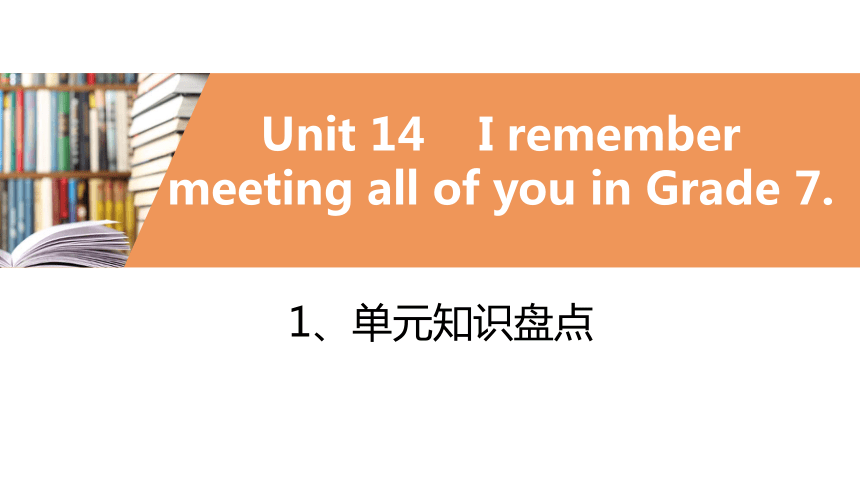 | |
| 格式 | pptx | ||
| 文件大小 | 366.4KB | ||
| 资源类型 | 教案 | ||
| 版本资源 | 人教新目标(Go for it)版 | ||
| 科目 | 英语 | ||
| 更新时间 | 2022-08-05 20:59:41 | ||
图片预览

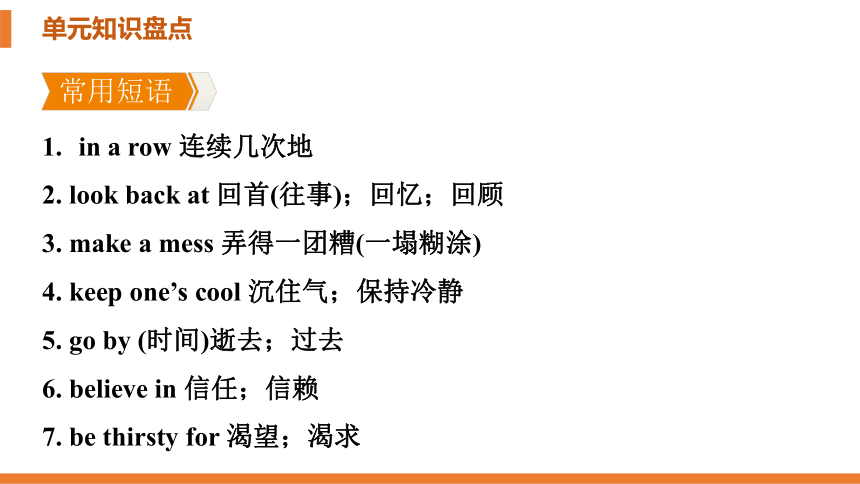
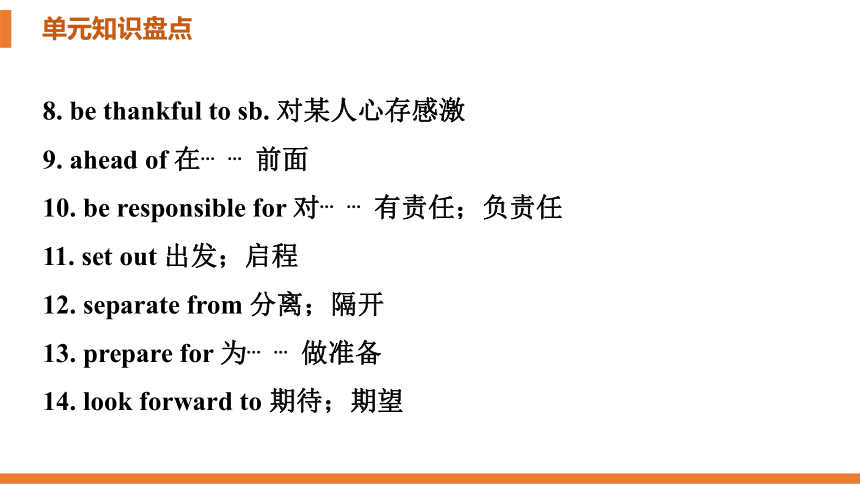
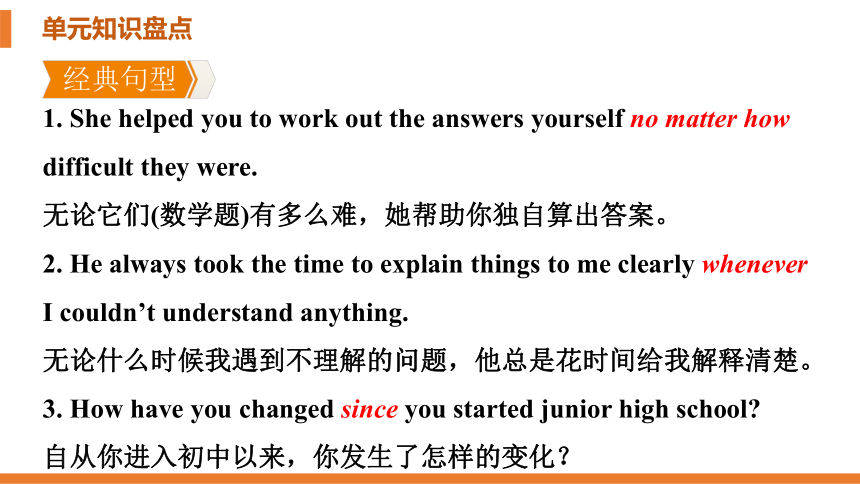
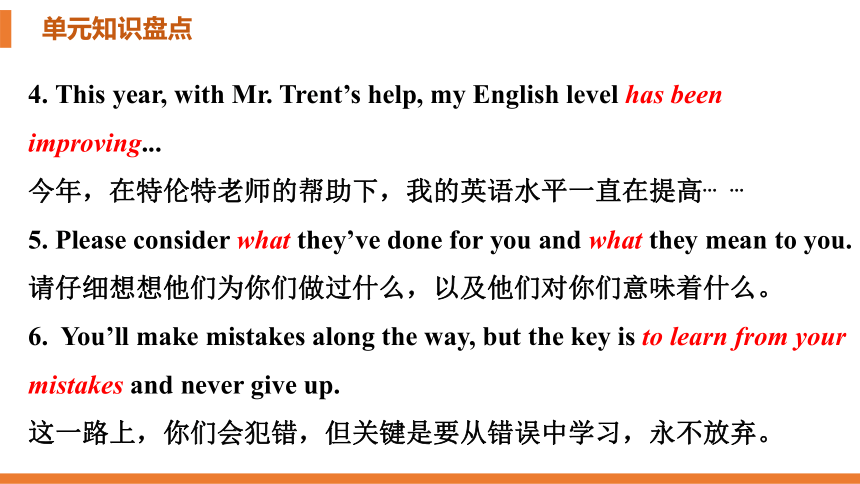
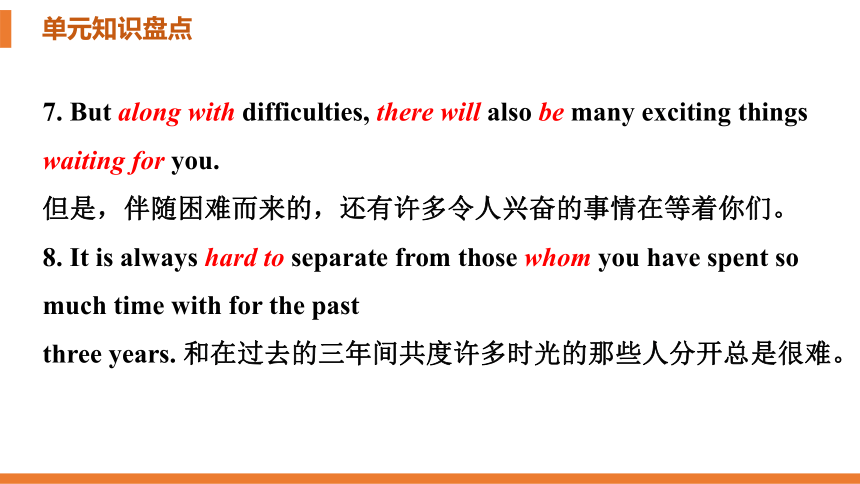
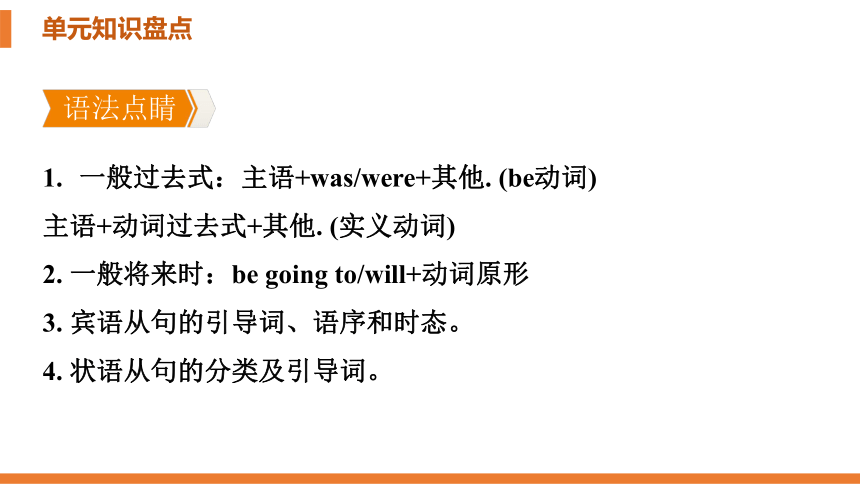
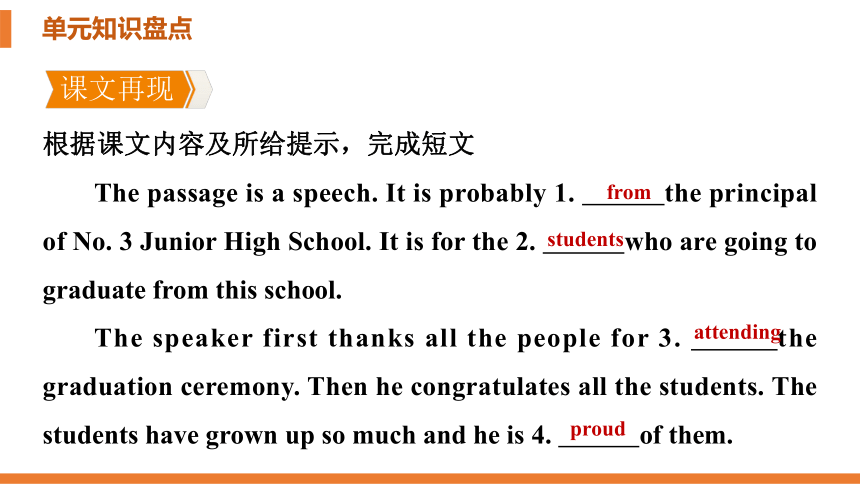
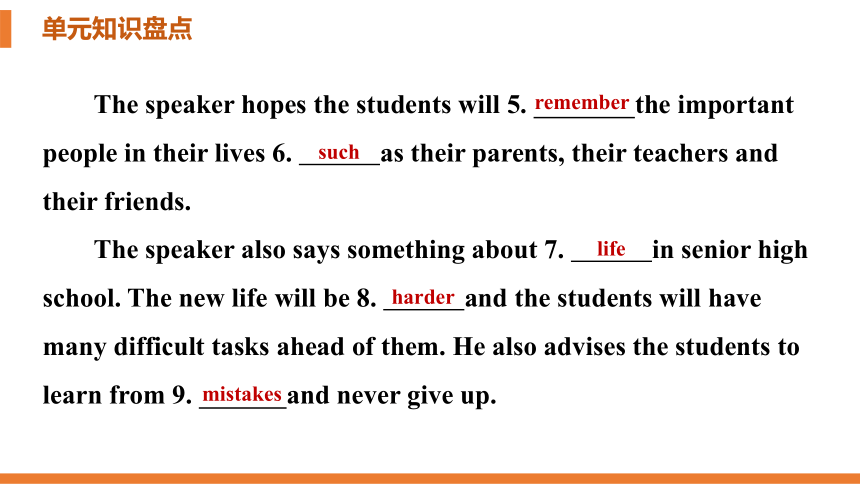
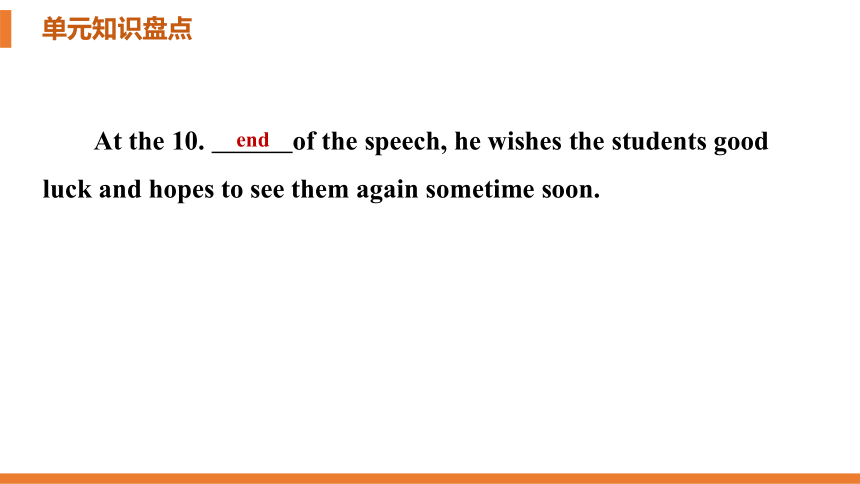

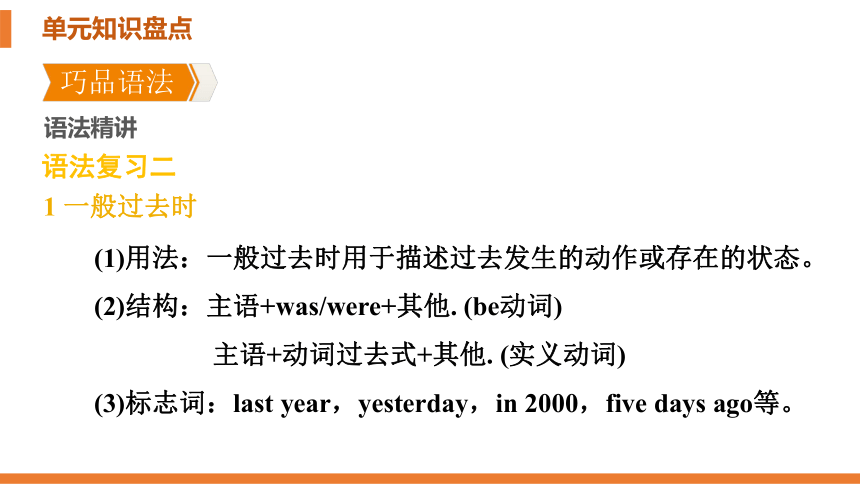
文档简介
(共63张PPT)
Unit 14 I remember meeting all of you in Grade 7.
1、单元知识盘点
常用短语
in a row 连续几次地
2. look back at 回首(往事);回忆;回顾
3. make a mess 弄得一团糟(一塌糊涂)
4. keep one’s cool 沉住气;保持冷静
5. go by (时间)逝去;过去
6. believe in 信任;信赖
7. be thirsty for 渴望;渴求
8. be thankful to sb. 对某人心存感激
9. ahead of 在 前面
10. be responsible for 对 有责任;负责任
11. set out 出发;启程
12. separate from 分离;隔开
13. prepare for 为 做准备
14. look forward to 期待;期望
经典句型
1. She helped you to work out the answers yourself no matter how difficult they were.
无论它们(数学题)有多么难,她帮助你独自算出答案。
2. He always took the time to explain things to me clearly whenever I couldn’t understand anything.
无论什么时候我遇到不理解的问题,他总是花时间给我解释清楚。
3. How have you changed since you started junior high school
自从你进入初中以来,你发生了怎样的变化?
4. This year, with Mr. Trent’s help, my English level has been improving...
今年,在特伦特老师的帮助下,我的英语水平一直在提高
5. Please consider what they’ve done for you and what they mean to you.
请仔细想想他们为你们做过什么,以及他们对你们意味着什么。
6. You’ll make mistakes along the way, but the key is to learn from your mistakes and never give up.
这一路上,你们会犯错,但关键是要从错误中学习,永不放弃。
7. But along with difficulties, there will also be many exciting things waiting for you.
但是,伴随困难而来的,还有许多令人兴奋的事情在等着你们。
8. It is always hard to separate from those whom you have spent so much time with for the past
three years. 和在过去的三年间共度许多时光的那些人分开总是很难。
语法点睛
一般过去式:主语+was/were+其他. (be动词)
主语+动词过去式+其他. (实义动词)
2. 一般将来时:be going to/will+动词原形
3. 宾语从句的引导词、语序和时态。
4. 状语从句的分类及引导词。
课文再现
根据课文内容及所给提示,完成短文
The passage is a speech. It is probably 1. the principal of No. 3 Junior High School. It is for the 2. who are going to graduate from this school.
The speaker first thanks all the people for 3. the graduation ceremony. Then he congratulates all the students. The students have grown up so much and he is 4. of them.
from
students
attending
proud
The speaker hopes the students will 5. the important people in their lives 6. as their parents, their teachers and their friends.
The speaker also says something about 7. in senior high school. The new life will be 8. and the students will have many difficult tasks ahead of them. He also advises the students to learn from 9. and never give up.
remember
such
life
harder
mistakes
At the 10. of the speech, he wishes the students good luck and hopes to see them again sometime soon.
end
2、单元专题聚焦
巧品语法
语法精讲
(1)用法:一般过去时用于描述过去发生的动作或存在的状态。
(2)结构:主语+was/were+其他. (be动词)
主语+动词过去式+其他. (实义动词)
(3)标志词:last year,yesterday,in 2000,five days ago等。
语法复习二
1 一般过去时
They had a good time last night.
昨天晚上他们玩得很开心。
I paid two hundred yuan for these books.
我花了200元买这些书。
2 一般将来时
(1)用法:一般将来时用于描述将要发生的动作或存在的状态。
(2)结构:be going to+动词原形;will+动词原形;以现在进行时的结构表示将来(用于此结构的动词常是表示位移的动词,如come,leave等)。
(3)标志词:tomorrow,the day after tomorrow,next week,next year,in the future等。They are going to visit the Great Wall.
他们打算去游览长城。
I will stay at home and watch TV.
我将待在家里看电视。
The bus is coming.
公共汽车就要来了。
3 宾语从句
(1)引导词
that He said (that) he wanted to stay at home.
他说他想待在家里。
if, whether I want to know if/whether he lives there.
我想知道他是否住在那里。
特殊疑问词 Can you tell me where the No.3 bus stop is?你能告诉我3路公共汽车站在哪里吗?
(2)语序
宾语从句的语序应为陈述语序。
Can you tell me how I can get to the zoo
你能告诉我怎样去动物园吗?
(3)时态
如果主句的时态是一般现在时,宾语从句的时态不受影响;如果主句的时态是一般过去时,宾语从句只能用相应的过去时态(一般过去时、 过去进行时、过去将来时、过去完成时)。
He told me that he was preparing for the sports meeting.
他告诉我他正在为运动会做准备。
[注意]如果宾语从句所陈述的是客观真理,其时态用一般现在时。
Our teacher told us that the earth travels around the sun.
我们老师告诉我们地球绕着太阳转。
4 状语从句
在复合句中,修饰主句中动词、形容词或副词的从句叫作状语从句。
(1)时间状语从句。引导词有when,as,while,before,after,since,till,until,as soon as等。
When Jack got home, his mother was cooking.
当杰克到家时,他妈妈正在做饭。
[注意]在时间状语从句中,如果主句是一般将来时,从句常用一般现在时表示将来。
When he comes back, I’ll give you a call.
当他回来时,我会给你打电话的。
(2)地点状语从句。引导词有where,wherever。
Wherever he goes, he always brings his pet dog.
无论他去哪里,他总是带着他的宠物狗。
(3)条件状语从句。引导词有 if,unless等。
If it rains, I’ll go by car. 如果下雨,我就开车去。
[注意]在条件状语从句中,如果主句是一般将来时,从句要用一般现在时。
If the weather is fine tomorrow, we’ll go hiking.
如果明天天气晴,我们将徒步旅行。
(4)原因状语从句。引导词有because,for,since,as等。
I didn’t go because I was afraid.
我没去因为我害怕。
(5)目的状语从句。引导词有so that,in order that等。
He got up very early so that he could catch the early bus.
他起得很早以便能赶上早班公交车。
(6)结果状语从句。引导词有so...that,such...that。
It was raining so hard that we couldn’t see the road.
雨下得如此大以至于我们看不见路。
It’s such a noisy room that I want to leave right now.
那是一个如此吵闹的房间以至于我想马上离开。
(7)让步状语从句。引导词有though,even though/if,
although,“no matter+疑问词”,“疑问词+后缀-ever”。
Although he didn’t pass the exam, his father didn’t get angry with him.
虽然他没有通过考试,但是他的父亲没有生他的气。
[注意]当句子中有though,although时,不能再用but,但是可以用yet。
(8)比较状语从句。引导词有as...as...,than等,如果被比较的对象为名词或代词,一般采用省略形式,省去与主句中相同的部分。
Her dress is as beautiful as mine.
她的连衣裙和我的连衣裙一样漂亮。
Mr. Zhou drives much faster than Mr. Zhang does.
周先生比张先生开车开得快多了。
Ⅰ. 单项选择
1. |武汉中考|He ______his English teacher when he was sightseeing in Paris.
A. has met B. had met
C. met D. would meet
C
考点直击
【解析】 考查动词的时态。根据“when he was sightseeing in Paris”可知,事情发生在过去,故选C。
2. |邵阳中考|—Jack, you look more handsome in your new shirt today.
—Oh, really I ______it in a cheap store with my mom.
A. buy B. will buy
C. bought
C
【解析】考查动词的时态。由语境可知,“买衬衫”的动作发生在过去,故应用一般过去时。
3. |安顺中考|—The weather report says that it tomorrow in most parts of Anshun city.
—If it , the school sports meet will be canceled.
A. will rain; will rain B. will rain; rains
C. rains; will rain D. rains; rains
B
【解析】 考查动词的时态。前句由“tomorrow”可知,用一般将来时态;后句是if引导的条件状语从句,主句用一般将来时,从句用一般现在时表示将来,故选B。
4. |天水中考|There great changes in Tianshui in next ten years.
A. are B. were
C. will be D. are going to have
C
【解析】 考查动词的时态。句意:在未来的十年里,天水市将会有巨大的变化。本句为there be句型,结合句中的时间状语“in next ten years”可知,要用there be句型的一般将来时结构:there will be或there is/are going to be。故选C。
5. |菏泽中考|—Could you please tell me ______
—Sure. Just go along this street and you’ll find it on your left.
A. where is the bookstore
B. where the bookstore is
C. how can I get to the bookstore
B
【解析】 考查宾语从句。根据答语可知,问句是在询问书店的位置,且宾语从句要用陈述语序,排除A、C选项。故选B。
6. |北京中考|—Alice, could you tell me London
—Sure. Last Sunday.
A. when Mr. Smith left B. when Mr. Smith will leave
C. when did Mr. Smith leave D. when will Mr. Smith leave
A
【解析】 考查宾语从句。宾语从句应用陈述语序,排除C、D项;根据答语“Last Sunday.”可知,用一般过去时。故选A。
7. |黔南中考|Jack has learned more about teamwork(团队合作)_____ he joined the soccer team.
A. until B. since
C. while D. though
B
【解析】 考查连词的用法。句意:自从杰克加入足球队以来,他更多地学会了团队合作。until意为“直到”;since意为“自从……以来”;while意为“当……的时候”;though意为“虽然”。主句为现在完成时,故应用since引导从句,故选B。
8. |咸宁中考|—Harry Potter is an interesting novel I want to read it again.
—I agree with you.
A. so; that B. too; to
C. such; that D. as; as
C
【解析】 考查结果状语从句。句意:“《哈利波特》是如此有趣的一部小说,我想再看一遍。”“我同意你的说法。”so…that…意为“如此……以至于……”,so后接形容词,that后接从句;too…to…意为“太……而不能……”,too后接形容词,to后接动词原形;as…as…意为“和……一样……”,第一个as后接形容词或副词,第二个as后接名词、代词或从句。第一空后是名词,应用such修饰,第二空后为从句,用that引导。故选C。
9. |河北中考|—The bread is really delicious.
—Thank you. I it myself.
A. make B. made
C. will make D. am making
B
【解析】 考查动词的时态。句意:“这面包真的很可口。”“谢谢你。我自己做的。”根据语境可知,“做面包”的动作发生在过去,应用一般过去时。故选B。
10. |扬州中考| Hi, guys, please write three facts you last term in your project.
A. learned B. are learning
C. have learned D. learn
A
【解析】 考查动词的时态。句意:嗨,伙计们,请在课题当中写三个你们上学期学到的事实。由时间状语“last term”可知用一般过去时。故选A。
如何写好以“校园生活”为话题的文章
在本单元中,我们回顾了初中生活,并展望了高中生活。在中考中,我们会遇到以“描述校园生活”为话题的书面表达。该话题贴近学生生活,学生在写作的时候有话可说,有感可发。现在,就让我们一起结合实例来看看此类文章的写作技巧吧!
妙解写作
写 作 案 例
你校将组织一次与澳大利亚交换生的交流活动,主题为“M y D ream Senior H igh School”。请根据表格中所给的提示词,用英语写一篇发言稿,描述你理想中的高中学校。
Campus (校园) Teachers and classmates In class After class
large; beautiful... kind... free to choose subjects; a lot of practice... different kinds of clubs;do sports
要求:1. 词数:80—100(开头与结尾已给出,不计入总词数);
2. 文中不得出现真实的姓名和校名。
Ladies and gentlemen,
I’d like to share my dream senior high school with you._______
__________________________________________________________________________________________________________________
That’s all. Thanks for listening.
素 材 积 累
词汇库
memory, experience, feeling, excited, happy, worried, proud, sad, tired, shy, enjoyable, thankful, future, shall, will,
manager, difficult, task
短语箱
remember doing, overcome fear, read a text, meet the standards of, be patient with, be thirsty for, make a mess,
be going to, want to, hope to, plan to, look forward to, senior high school, get a business degree, ahead of, go
your separate way, be responsible for
句式链
①I remember losing a schoolbag. 我记得丢过一个书包。
②I’ll never forget the teacher who taught us English in Grade 7.
我永远不会忘记在七年级教我们英语的老师。
③I’ve become much better at speaking English.
我说英语说得更好了。
④I know that Mrs. Lee was always patient with you in math class.
我知道李老师在数学课上对你总是很有耐心。
⑤I used to play in class, but I don’t anymore.
我过去常常在课上玩,但是现在不了。
⑥I’m looking forward to going to senior high school.
我一直期待着上高中。
⑦I hope to be a manager in the future.
我希望将来成为一名经理。
⑧I want to work in a big city when I grow up.
当我长大后,我想在一座大城市工作。
五 步 妙 解
审
体裁 应用文 话题 理想中的高中学校
时态 一般将来时、一般现在时 人称 第一人称
段落 布局 开头:开篇点题,引起下文。 主体:按表格中所提供的信息进行详细描述。 结尾:呼应开头。 谴
在课上,我们自由选择我们感兴趣的学科。
(1)汉译英:
①在课上:_____________________________________________________
②自由做某事:
_____________________________________________________
be free to do sth.
in class
(2)翻译此句:______________________________________________________
In class, we are free to choose subjects that we are interested in.
模
开篇点题
详细描述
I’d like to share my dream senior high school with you.
...a large and beautiful campus...
What do you think of my dream senior high school
呼应开头
Teachers here are kind... classmates get along well with...
In class, we are free to...
After class... we can join different kinds of clubs...
Ladies and gentlemen,
I’d like to share my dream senior high school with you. The moment you enter this school, you will see a large and beautiful campus with trees and flowers here and there.
In this school, we are living like a big family. Teachers here are kind as parents and classmates get along well with each other like brothers and sisters. In class, we are free to choose subjects that we
润
are interested in and are given a lot of time to practice. After class, instead of doing much home-work, we can join different kinds of clubs and do whatever sports we like.
What do you think of my dream senior high school
That’s all. Thanks for listening.
点
该篇发言稿格式正确,结构清晰,行文流畅,语言亲切,感情真挚,是一篇标准的满分作文,值得大家学习和背诵。
1. 本文属于应用文中的发言稿,格式正确,要点全面,覆盖了表格中给出的所有提示信息,这是本文能够成为优秀范文的前提条件。
2. 作者在详细描述“我的理想学校”时,从四个方面展开叙述,分别是校园环境、师生关系、课堂氛围和课后活动。结构清晰,条理清楚,而且恰当地使用了不同的连接词和过渡词,如the moment,after class等。
3. 本文句式丰富,使用了不同类型的主从复合句,如时间状语从句等。
小 试 身 手
课堂是教我们做人、传授我们知识和方法、培养我们能力和展现我们个性的重要场所。在初中三年的学习中,你一定有许多难忘的瞬间。请以“An Unforgettable Class”为题,写一篇英语短文,讲述令你难忘的一节课。
要点提示:
1. 令你难忘的这节课发生的时间及涉及的学科等;
2. 这节课中令你难忘的活动及事件的发生过程;
3. 你的感受或评价。
写作要求:
1. 短文的内容包含所提示的要点,语言要流畅,可围绕要点提示适当增加情节,以使短文的意思连贯;
2. 短文中不得出现真实的姓名、校名及地名;
3. 词数:90词左右。
An Unforgettable Class
__________________________________________________________________________________________________________________
One possible version:
An Unforgettable Class
Last Monday, I had a wonderful experience in the art class. And I was greatly impressed. The art teacher took me to the park which was just beside my school. He told me to draw the fantastic views. The sun was shining brightly and I sat in a good position and began to draw. With the nice grass, the running river, the colorful flowers, I can't help feeling happy. Nevertheless, I had to go back to school. I had to wave goodbye to the park.
In general, it is one of the most unforgettable classes that I have ever had. That day, I was on top of the world.
运用词缀法猜测词义(二)
下面介绍几种常见的后缀:
1. 名词后缀
(1) -ant, -ent表示人。如:assistant(助手),agent(代理人)
(2) -eer表示“从事 的人”。如:engineer(工程师),volunteer(志愿者)
(3) -er表示“从事某种职业的人;某地方的人”。如:teacher(教师),villager(村民)
培优课堂
(4) -or表示人。如:actor(演员),collector (收藏者)
(5) -an, -ian, -ese表示“ 地方的人;精通 的人”。如:American(美国人),Asian(亚洲人),Chinese(中国人)
(6) -ist表示“从事 研究者;信仰 主义者”。如:chemist(化学家),artist(艺术家)
(7) -ion, -sion, -tion加在动词后面。如:solution(解决),decision(决定),selection(选择)
(8) -dom表示国家、职业或状况。如:freedom(自由),kingdom(王国),wisdom(智慧)
(9) -hood表示关系或抽象意义。如:brotherhood(手足情谊),neighborhood(街区)
(10) -ment加在动词后面。如:advertisement(广告),punishment(惩罚)
(11) -ness可以加在形容词后,构成抽象名词。如:happiness(幸福),kindness(和蔼)
(12) -ship加在名词后面,表示状态或抽象意义。如:friendship(友谊),relationship(关系)
(13) -logist表示“ 学家;研究者”。如:biologist(生物学家),psychologist(心理学家)
(14) -ess表示女性人称名词。如:actress(女演员),hostess(女主人)
(15) -ary表示“从事 的人”。如:secretary(秘书)
2. 形容词后缀
(1) -able加在动词后面。如:acceptable(可接受的),avoidable(可避免的),readable(可读的)
(2) -an加在地名后面。如:African(非洲的),Australian(澳大利亚的),Canadian(加拿大的)
(3) -ern表示方向。如:eastern(东方的),northern(北方的),southern(南方的),Western(西方的)
(4) -ic加在名词后面。如:economic(经济的),historic(历史上著名的)
(5) -ical加在名词后面。如:economical(经济的),historical(历史的),political(政治的)
(6) -ish
①加在国家名称后面,表示该国的或者该国的人。如:Irish(爱尔兰的),Danish(丹麦的)
②加在普通名词后面,表示“具有 性质”,或者含有轻蔑的意思。如:foolish(愚昧的),selfish(自私的)
(7) -ed加在名词后面。如:aged(年长的),cultured(有文化的),talented(有才能的)
(8) -ing加在动词后面。如:exciting(令人激动的),interesting(有趣的)
3. 副词后缀
-ly加在形容词后面。如:immediately(立即),quickly(快速地)
谢 谢 观 看!
Unit 14 I remember meeting all of you in Grade 7.
1、单元知识盘点
常用短语
in a row 连续几次地
2. look back at 回首(往事);回忆;回顾
3. make a mess 弄得一团糟(一塌糊涂)
4. keep one’s cool 沉住气;保持冷静
5. go by (时间)逝去;过去
6. believe in 信任;信赖
7. be thirsty for 渴望;渴求
8. be thankful to sb. 对某人心存感激
9. ahead of 在 前面
10. be responsible for 对 有责任;负责任
11. set out 出发;启程
12. separate from 分离;隔开
13. prepare for 为 做准备
14. look forward to 期待;期望
经典句型
1. She helped you to work out the answers yourself no matter how difficult they were.
无论它们(数学题)有多么难,她帮助你独自算出答案。
2. He always took the time to explain things to me clearly whenever I couldn’t understand anything.
无论什么时候我遇到不理解的问题,他总是花时间给我解释清楚。
3. How have you changed since you started junior high school
自从你进入初中以来,你发生了怎样的变化?
4. This year, with Mr. Trent’s help, my English level has been improving...
今年,在特伦特老师的帮助下,我的英语水平一直在提高
5. Please consider what they’ve done for you and what they mean to you.
请仔细想想他们为你们做过什么,以及他们对你们意味着什么。
6. You’ll make mistakes along the way, but the key is to learn from your mistakes and never give up.
这一路上,你们会犯错,但关键是要从错误中学习,永不放弃。
7. But along with difficulties, there will also be many exciting things waiting for you.
但是,伴随困难而来的,还有许多令人兴奋的事情在等着你们。
8. It is always hard to separate from those whom you have spent so much time with for the past
three years. 和在过去的三年间共度许多时光的那些人分开总是很难。
语法点睛
一般过去式:主语+was/were+其他. (be动词)
主语+动词过去式+其他. (实义动词)
2. 一般将来时:be going to/will+动词原形
3. 宾语从句的引导词、语序和时态。
4. 状语从句的分类及引导词。
课文再现
根据课文内容及所给提示,完成短文
The passage is a speech. It is probably 1. the principal of No. 3 Junior High School. It is for the 2. who are going to graduate from this school.
The speaker first thanks all the people for 3. the graduation ceremony. Then he congratulates all the students. The students have grown up so much and he is 4. of them.
from
students
attending
proud
The speaker hopes the students will 5. the important people in their lives 6. as their parents, their teachers and their friends.
The speaker also says something about 7. in senior high school. The new life will be 8. and the students will have many difficult tasks ahead of them. He also advises the students to learn from 9. and never give up.
remember
such
life
harder
mistakes
At the 10. of the speech, he wishes the students good luck and hopes to see them again sometime soon.
end
2、单元专题聚焦
巧品语法
语法精讲
(1)用法:一般过去时用于描述过去发生的动作或存在的状态。
(2)结构:主语+was/were+其他. (be动词)
主语+动词过去式+其他. (实义动词)
(3)标志词:last year,yesterday,in 2000,five days ago等。
语法复习二
1 一般过去时
They had a good time last night.
昨天晚上他们玩得很开心。
I paid two hundred yuan for these books.
我花了200元买这些书。
2 一般将来时
(1)用法:一般将来时用于描述将要发生的动作或存在的状态。
(2)结构:be going to+动词原形;will+动词原形;以现在进行时的结构表示将来(用于此结构的动词常是表示位移的动词,如come,leave等)。
(3)标志词:tomorrow,the day after tomorrow,next week,next year,in the future等。They are going to visit the Great Wall.
他们打算去游览长城。
I will stay at home and watch TV.
我将待在家里看电视。
The bus is coming.
公共汽车就要来了。
3 宾语从句
(1)引导词
that He said (that) he wanted to stay at home.
他说他想待在家里。
if, whether I want to know if/whether he lives there.
我想知道他是否住在那里。
特殊疑问词 Can you tell me where the No.3 bus stop is?你能告诉我3路公共汽车站在哪里吗?
(2)语序
宾语从句的语序应为陈述语序。
Can you tell me how I can get to the zoo
你能告诉我怎样去动物园吗?
(3)时态
如果主句的时态是一般现在时,宾语从句的时态不受影响;如果主句的时态是一般过去时,宾语从句只能用相应的过去时态(一般过去时、 过去进行时、过去将来时、过去完成时)。
He told me that he was preparing for the sports meeting.
他告诉我他正在为运动会做准备。
[注意]如果宾语从句所陈述的是客观真理,其时态用一般现在时。
Our teacher told us that the earth travels around the sun.
我们老师告诉我们地球绕着太阳转。
4 状语从句
在复合句中,修饰主句中动词、形容词或副词的从句叫作状语从句。
(1)时间状语从句。引导词有when,as,while,before,after,since,till,until,as soon as等。
When Jack got home, his mother was cooking.
当杰克到家时,他妈妈正在做饭。
[注意]在时间状语从句中,如果主句是一般将来时,从句常用一般现在时表示将来。
When he comes back, I’ll give you a call.
当他回来时,我会给你打电话的。
(2)地点状语从句。引导词有where,wherever。
Wherever he goes, he always brings his pet dog.
无论他去哪里,他总是带着他的宠物狗。
(3)条件状语从句。引导词有 if,unless等。
If it rains, I’ll go by car. 如果下雨,我就开车去。
[注意]在条件状语从句中,如果主句是一般将来时,从句要用一般现在时。
If the weather is fine tomorrow, we’ll go hiking.
如果明天天气晴,我们将徒步旅行。
(4)原因状语从句。引导词有because,for,since,as等。
I didn’t go because I was afraid.
我没去因为我害怕。
(5)目的状语从句。引导词有so that,in order that等。
He got up very early so that he could catch the early bus.
他起得很早以便能赶上早班公交车。
(6)结果状语从句。引导词有so...that,such...that。
It was raining so hard that we couldn’t see the road.
雨下得如此大以至于我们看不见路。
It’s such a noisy room that I want to leave right now.
那是一个如此吵闹的房间以至于我想马上离开。
(7)让步状语从句。引导词有though,even though/if,
although,“no matter+疑问词”,“疑问词+后缀-ever”。
Although he didn’t pass the exam, his father didn’t get angry with him.
虽然他没有通过考试,但是他的父亲没有生他的气。
[注意]当句子中有though,although时,不能再用but,但是可以用yet。
(8)比较状语从句。引导词有as...as...,than等,如果被比较的对象为名词或代词,一般采用省略形式,省去与主句中相同的部分。
Her dress is as beautiful as mine.
她的连衣裙和我的连衣裙一样漂亮。
Mr. Zhou drives much faster than Mr. Zhang does.
周先生比张先生开车开得快多了。
Ⅰ. 单项选择
1. |武汉中考|He ______his English teacher when he was sightseeing in Paris.
A. has met B. had met
C. met D. would meet
C
考点直击
【解析】 考查动词的时态。根据“when he was sightseeing in Paris”可知,事情发生在过去,故选C。
2. |邵阳中考|—Jack, you look more handsome in your new shirt today.
—Oh, really I ______it in a cheap store with my mom.
A. buy B. will buy
C. bought
C
【解析】考查动词的时态。由语境可知,“买衬衫”的动作发生在过去,故应用一般过去时。
3. |安顺中考|—The weather report says that it tomorrow in most parts of Anshun city.
—If it , the school sports meet will be canceled.
A. will rain; will rain B. will rain; rains
C. rains; will rain D. rains; rains
B
【解析】 考查动词的时态。前句由“tomorrow”可知,用一般将来时态;后句是if引导的条件状语从句,主句用一般将来时,从句用一般现在时表示将来,故选B。
4. |天水中考|There great changes in Tianshui in next ten years.
A. are B. were
C. will be D. are going to have
C
【解析】 考查动词的时态。句意:在未来的十年里,天水市将会有巨大的变化。本句为there be句型,结合句中的时间状语“in next ten years”可知,要用there be句型的一般将来时结构:there will be或there is/are going to be。故选C。
5. |菏泽中考|—Could you please tell me ______
—Sure. Just go along this street and you’ll find it on your left.
A. where is the bookstore
B. where the bookstore is
C. how can I get to the bookstore
B
【解析】 考查宾语从句。根据答语可知,问句是在询问书店的位置,且宾语从句要用陈述语序,排除A、C选项。故选B。
6. |北京中考|—Alice, could you tell me London
—Sure. Last Sunday.
A. when Mr. Smith left B. when Mr. Smith will leave
C. when did Mr. Smith leave D. when will Mr. Smith leave
A
【解析】 考查宾语从句。宾语从句应用陈述语序,排除C、D项;根据答语“Last Sunday.”可知,用一般过去时。故选A。
7. |黔南中考|Jack has learned more about teamwork(团队合作)_____ he joined the soccer team.
A. until B. since
C. while D. though
B
【解析】 考查连词的用法。句意:自从杰克加入足球队以来,他更多地学会了团队合作。until意为“直到”;since意为“自从……以来”;while意为“当……的时候”;though意为“虽然”。主句为现在完成时,故应用since引导从句,故选B。
8. |咸宁中考|—Harry Potter is an interesting novel I want to read it again.
—I agree with you.
A. so; that B. too; to
C. such; that D. as; as
C
【解析】 考查结果状语从句。句意:“《哈利波特》是如此有趣的一部小说,我想再看一遍。”“我同意你的说法。”so…that…意为“如此……以至于……”,so后接形容词,that后接从句;too…to…意为“太……而不能……”,too后接形容词,to后接动词原形;as…as…意为“和……一样……”,第一个as后接形容词或副词,第二个as后接名词、代词或从句。第一空后是名词,应用such修饰,第二空后为从句,用that引导。故选C。
9. |河北中考|—The bread is really delicious.
—Thank you. I it myself.
A. make B. made
C. will make D. am making
B
【解析】 考查动词的时态。句意:“这面包真的很可口。”“谢谢你。我自己做的。”根据语境可知,“做面包”的动作发生在过去,应用一般过去时。故选B。
10. |扬州中考| Hi, guys, please write three facts you last term in your project.
A. learned B. are learning
C. have learned D. learn
A
【解析】 考查动词的时态。句意:嗨,伙计们,请在课题当中写三个你们上学期学到的事实。由时间状语“last term”可知用一般过去时。故选A。
如何写好以“校园生活”为话题的文章
在本单元中,我们回顾了初中生活,并展望了高中生活。在中考中,我们会遇到以“描述校园生活”为话题的书面表达。该话题贴近学生生活,学生在写作的时候有话可说,有感可发。现在,就让我们一起结合实例来看看此类文章的写作技巧吧!
妙解写作
写 作 案 例
你校将组织一次与澳大利亚交换生的交流活动,主题为“M y D ream Senior H igh School”。请根据表格中所给的提示词,用英语写一篇发言稿,描述你理想中的高中学校。
Campus (校园) Teachers and classmates In class After class
large; beautiful... kind... free to choose subjects; a lot of practice... different kinds of clubs;do sports
要求:1. 词数:80—100(开头与结尾已给出,不计入总词数);
2. 文中不得出现真实的姓名和校名。
Ladies and gentlemen,
I’d like to share my dream senior high school with you._______
__________________________________________________________________________________________________________________
That’s all. Thanks for listening.
素 材 积 累
词汇库
memory, experience, feeling, excited, happy, worried, proud, sad, tired, shy, enjoyable, thankful, future, shall, will,
manager, difficult, task
短语箱
remember doing, overcome fear, read a text, meet the standards of, be patient with, be thirsty for, make a mess,
be going to, want to, hope to, plan to, look forward to, senior high school, get a business degree, ahead of, go
your separate way, be responsible for
句式链
①I remember losing a schoolbag. 我记得丢过一个书包。
②I’ll never forget the teacher who taught us English in Grade 7.
我永远不会忘记在七年级教我们英语的老师。
③I’ve become much better at speaking English.
我说英语说得更好了。
④I know that Mrs. Lee was always patient with you in math class.
我知道李老师在数学课上对你总是很有耐心。
⑤I used to play in class, but I don’t anymore.
我过去常常在课上玩,但是现在不了。
⑥I’m looking forward to going to senior high school.
我一直期待着上高中。
⑦I hope to be a manager in the future.
我希望将来成为一名经理。
⑧I want to work in a big city when I grow up.
当我长大后,我想在一座大城市工作。
五 步 妙 解
审
体裁 应用文 话题 理想中的高中学校
时态 一般将来时、一般现在时 人称 第一人称
段落 布局 开头:开篇点题,引起下文。 主体:按表格中所提供的信息进行详细描述。 结尾:呼应开头。 谴
在课上,我们自由选择我们感兴趣的学科。
(1)汉译英:
①在课上:_____________________________________________________
②自由做某事:
_____________________________________________________
be free to do sth.
in class
(2)翻译此句:______________________________________________________
In class, we are free to choose subjects that we are interested in.
模
开篇点题
详细描述
I’d like to share my dream senior high school with you.
...a large and beautiful campus...
What do you think of my dream senior high school
呼应开头
Teachers here are kind... classmates get along well with...
In class, we are free to...
After class... we can join different kinds of clubs...
Ladies and gentlemen,
I’d like to share my dream senior high school with you. The moment you enter this school, you will see a large and beautiful campus with trees and flowers here and there.
In this school, we are living like a big family. Teachers here are kind as parents and classmates get along well with each other like brothers and sisters. In class, we are free to choose subjects that we
润
are interested in and are given a lot of time to practice. After class, instead of doing much home-work, we can join different kinds of clubs and do whatever sports we like.
What do you think of my dream senior high school
That’s all. Thanks for listening.
点
该篇发言稿格式正确,结构清晰,行文流畅,语言亲切,感情真挚,是一篇标准的满分作文,值得大家学习和背诵。
1. 本文属于应用文中的发言稿,格式正确,要点全面,覆盖了表格中给出的所有提示信息,这是本文能够成为优秀范文的前提条件。
2. 作者在详细描述“我的理想学校”时,从四个方面展开叙述,分别是校园环境、师生关系、课堂氛围和课后活动。结构清晰,条理清楚,而且恰当地使用了不同的连接词和过渡词,如the moment,after class等。
3. 本文句式丰富,使用了不同类型的主从复合句,如时间状语从句等。
小 试 身 手
课堂是教我们做人、传授我们知识和方法、培养我们能力和展现我们个性的重要场所。在初中三年的学习中,你一定有许多难忘的瞬间。请以“An Unforgettable Class”为题,写一篇英语短文,讲述令你难忘的一节课。
要点提示:
1. 令你难忘的这节课发生的时间及涉及的学科等;
2. 这节课中令你难忘的活动及事件的发生过程;
3. 你的感受或评价。
写作要求:
1. 短文的内容包含所提示的要点,语言要流畅,可围绕要点提示适当增加情节,以使短文的意思连贯;
2. 短文中不得出现真实的姓名、校名及地名;
3. 词数:90词左右。
An Unforgettable Class
__________________________________________________________________________________________________________________
One possible version:
An Unforgettable Class
Last Monday, I had a wonderful experience in the art class. And I was greatly impressed. The art teacher took me to the park which was just beside my school. He told me to draw the fantastic views. The sun was shining brightly and I sat in a good position and began to draw. With the nice grass, the running river, the colorful flowers, I can't help feeling happy. Nevertheless, I had to go back to school. I had to wave goodbye to the park.
In general, it is one of the most unforgettable classes that I have ever had. That day, I was on top of the world.
运用词缀法猜测词义(二)
下面介绍几种常见的后缀:
1. 名词后缀
(1) -ant, -ent表示人。如:assistant(助手),agent(代理人)
(2) -eer表示“从事 的人”。如:engineer(工程师),volunteer(志愿者)
(3) -er表示“从事某种职业的人;某地方的人”。如:teacher(教师),villager(村民)
培优课堂
(4) -or表示人。如:actor(演员),collector (收藏者)
(5) -an, -ian, -ese表示“ 地方的人;精通 的人”。如:American(美国人),Asian(亚洲人),Chinese(中国人)
(6) -ist表示“从事 研究者;信仰 主义者”。如:chemist(化学家),artist(艺术家)
(7) -ion, -sion, -tion加在动词后面。如:solution(解决),decision(决定),selection(选择)
(8) -dom表示国家、职业或状况。如:freedom(自由),kingdom(王国),wisdom(智慧)
(9) -hood表示关系或抽象意义。如:brotherhood(手足情谊),neighborhood(街区)
(10) -ment加在动词后面。如:advertisement(广告),punishment(惩罚)
(11) -ness可以加在形容词后,构成抽象名词。如:happiness(幸福),kindness(和蔼)
(12) -ship加在名词后面,表示状态或抽象意义。如:friendship(友谊),relationship(关系)
(13) -logist表示“ 学家;研究者”。如:biologist(生物学家),psychologist(心理学家)
(14) -ess表示女性人称名词。如:actress(女演员),hostess(女主人)
(15) -ary表示“从事 的人”。如:secretary(秘书)
2. 形容词后缀
(1) -able加在动词后面。如:acceptable(可接受的),avoidable(可避免的),readable(可读的)
(2) -an加在地名后面。如:African(非洲的),Australian(澳大利亚的),Canadian(加拿大的)
(3) -ern表示方向。如:eastern(东方的),northern(北方的),southern(南方的),Western(西方的)
(4) -ic加在名词后面。如:economic(经济的),historic(历史上著名的)
(5) -ical加在名词后面。如:economical(经济的),historical(历史的),political(政治的)
(6) -ish
①加在国家名称后面,表示该国的或者该国的人。如:Irish(爱尔兰的),Danish(丹麦的)
②加在普通名词后面,表示“具有 性质”,或者含有轻蔑的意思。如:foolish(愚昧的),selfish(自私的)
(7) -ed加在名词后面。如:aged(年长的),cultured(有文化的),talented(有才能的)
(8) -ing加在动词后面。如:exciting(令人激动的),interesting(有趣的)
3. 副词后缀
-ly加在形容词后面。如:immediately(立即),quickly(快速地)
谢 谢 观 看!
同课章节目录
- Unit 1 How can we become good learners.
- Section A
- Section B
- Unit 2 I think that mooncakes are delicious!
- Section A
- Section B
- Unit 3 Could you please tell me where the restroom
- Section A
- Section B
- Unit 4 I used to be afraid of the dark.
- Section A
- Section B
- Unit 5 What are the shirts made of?
- Section A
- Section B
- Review of Units 1-5
- Unit 6 When was it invented?
- Section A
- Section B
- Unit 7 Teenagers should be allowed to choose their
- Section A
- Section B
- Unit 8 It must belong to Carla.
- Section A
- Section B
- Unit 9 I like music that I can dance to.
- Section A
- Section B
- Unit 10 You're supposed to shake hands.
- Section A
- Section B
- Review of Units 6-10
- Unit 11 Sad movies make me cry.
- Section A
- Section B
- Unit 12 Life is full of the unexpected
- Section A
- Section B
- Unit 13 We're trying to save the earth!
- Section A
- Section B
- Unit 14 I remember meeting all of you in Grade 7.
- Section A
- Section B
- Review of Units 11-14
